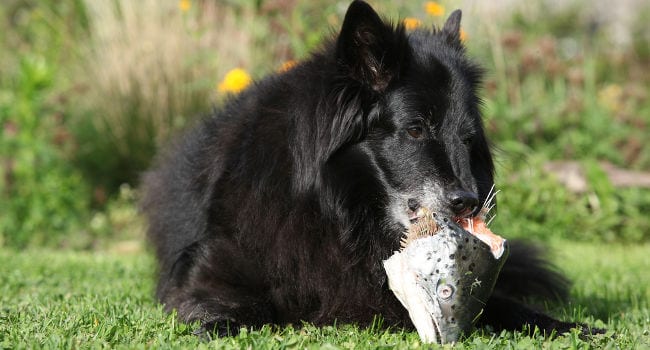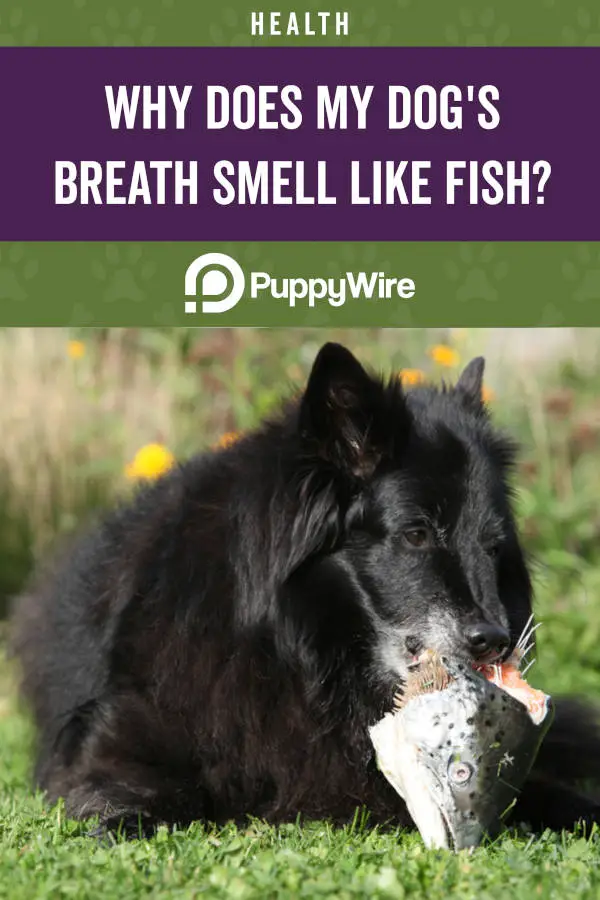Top 5 Reasons Why Your Dog’s Breath Smells Like Fish

While you may love your dog, you may not love it when their breath smells like fish. This occurs in just about every dog breed at one point or another during their lives, but the good news is you and your dog don’t have to live with this fishy smell.
There are several reasons why your dog’s breath could have that distinctly fish aroma, and we’re going to outline several possible causes. We’ll also cover how you can go about treating this fishy smelling breath safely.
1. Biting or Licking
Your dog may not groom themselves as a cat would, but one of the main culprits to that fishy smell could be your dog’s anal glands. Every dog has two anal glands, and these fill with a secretion over time that can have a very pungent smell.
If you don’t take your dog to the vet or groomer regularly, they may get blocked or clogged. While this isn’t exactly painful for your dog, it can be very uncomfortable if the glands go for a few days or a few weeks without being drained.
Your dog will attempt to alleviate the pressure in their glands by biting or licking at the area, or by scooting across the floor. Of course, if they bite or lick at the area, the fishy smell is transferred from their glands to their mouths, and this is when you start to smell it.
Fixing a Blocked or Full Anal Gland
These two glands are found at five o’clock and seven o’clock just inside your dog’s anus, and you can attempt to drain them yourself by gently squeezing them. If you can’t or don’t want to do this on your own, a trip to the vet or to the groomer is in order.
Normally, when you bring your dog in to be groomed, cleaning out their anal glands is part of the bathing process. But, if your dog needs this done more often, consider contacting your vet or possibly changing their diet because this can lead to blocked anal glands as well.
2. Diet
Omega-3 and Omega-6 fatty acids are important parts of your dog’s diet, and they usually come from fish-based food or fish oil. Take a look at your dog food label and see if these two ingredients are listed or if fish oil is listed.
It’s also important to note that a lot of the commercial dog food brands have whitefish or salmon as their main protein source, and this can cause a fishy smell to linger as well. The omega-3 and omega-6 fatty acids are important for your dog’s health because they help to protect against cell damage and they encourage healthy cell growth.
Fixing the Diet Issue
If you’ve looked at your dog food label and you see these ingredients, you’ve most likely found the source of the fishy smell, especially after your dog has just gotten done eating. If you can’t stand the smell, you can look into switch out your dog’s food with a different dog food that doesn’t have as high concentrations of these nutrients.
You may want to contact your vet before you switch out your dog’s diet because fish-based foods can be less likely to trigger allergies. If it’s just their food, you could also consider brushing their teeth after they eat or investing in some chews that are designed to clean your dog’s teeth and give them fresher breath.
3. Plaque Buildup
Your dog’s mouth is full of bacteria, just like a human’s mouth is, and it needs regular cleaning to stay healthy. If you don’t take care of your dog’s teeth, the plaque can start to build up and turn into tartar, gingivitis, or periodontal disease. According to the American Veterinary Dental College, over 80 percent of dogs three years old and older have some form of periodontal disease.
Unfortunately, this fish smell is a sign that the plaque could be turning into a more serious dental problem. Dogs, in general, are prone to dental problems like plaque buildup because their teeth are crowded together, and it’s more difficult to remove all of the stuck food.
Fixing Plaque Buildup
You can help to control any dental issues or stuck food by brushing your dog’s teeth regularly. Also, there are several products available that are specifically designed to help keep your dog’s teeth clean and plaque free.
If you can’t buy the dental-specific treats, try giving your dog a carrot to chew on. Carrots are packed with nutrients, they’re low calories, and they work great for helping to clean your dog’s teeth.
Also, it’s a good idea to schedule an appointment with your vet to get your dog’s teeth cleaned. They will be able to tell you how bad their teeth are, and what you have to do to fix them because bad teeth can lead to other more serious health problems if they’re not addressed quickly.
4. Kidney or Liver Problems
Maybe your dog’s issue with bad dog breath isn’t something that you can see on the surface. Kidney or liver problems have been linked to the fishy smell dogs can develop.
But before you panic, it’s important to know that these more serious health problems usually come with other warning signs like yellow-tinged gums, not eating, and throwing up. If you don’t see these symptoms, it might not be pointing to something as serious as you first thought.
Fixing Kidney or Liver Problems
You can’t fix kidney or liver problems on your own, and you can’t accurately diagnose these issues on your own either. The safest thing to do is schedule an appointment with your vet.
When you go to the appointment, discuss your concerns with them and point out any other symptoms you may have noticed. Your vet may request that your dog has blood work done, as this is a sure way to check for a variety of kidney and liver problems.
If the tests come back and you find out that your dog’s bad breath is caused by issues with their kidney or livers, your vet will advise you on what you should. It could be something as simple as altering your dog’s diet, or your vet may suggest monitoring them and starting them on medications to help control the issue.
5. Eating Their Own Feces
It may be gross, buy a lot of dogs can and will eat their own feces. There are dozens of reasons why your dog may be partaking in this habit, and they range from having enzyme deficiencies to stress or boredom.
A lot of dogs eat their own feces for attention or because they’re stressed out. The fishy smell can come from your dog’s anal glands as we mentioned above.
If the anal gland is blocked and your dog goes to the bathroom, this can be enough force to dislodge the blockage. Unfortunately, this can also result in a fishy smell, and if your dog turns around and eats the waste, it’ll transfer to their breath.
Fixing Feces Eating
The first thing you want to do is check your dog’s anal glands to see if they’re blocked or full. If you expel the buildup, it can help to get rid of the fishy smell in your dog’s poop.
Unfortunately, getting your dog to stop eating their own feces can be trickier unless you plan to follow them around every time you let them out and pick up their waste before they can eat it. You can always ask your vet for advice, or you can also look for deterrent sprays to put on their feces.
Bottom Line
If you notice that your dog’s breath smells like fish all of a sudden, you may want to check with your vet before you start doing any guesswork. It’s always better to be safe than sorry when it comes to your dog, and a vet can help you pinpoint what issue your dog is having.
You can try the more simple things like switching their diet, monitoring them when they go outside to go to the bathroom, or checking their anal glands. But, if you want to be sure, consult your vet.
